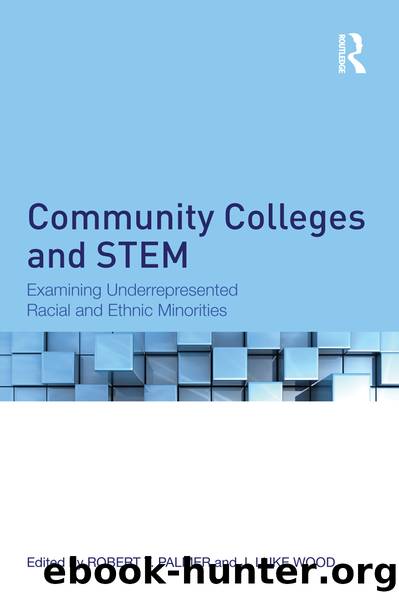Community Colleges and STEM by Unknown

Author:Unknown
Language: eng
Format: epub
ISBN: 1221503
Publisher: Taylor & Francis Group
Student Outcomes in Developmental Education
Researchers investigating the effectiveness of developmental education have used a variety of outcomes as indicators that the developmental student has remediated successfully (Bettinger & Long, 2005; Calcagno & Long, 2008). In general, outcomes of interest vary from short-term to long-term outcomes. Developmental education programs are designed to provide students who lack prerequisite academic skills the means to remediate skills and progress to college level coursework in the deficit subject areas such as reading, English and math (Bailey et al., 2010). Therefore, one measure of program effectiveness is the extent to which students remediate skills, progress to college level course-work and pass the gatekeeper course or courses in the areas of deficiency. Sustained progress, persistence, and completion of short-term outcomes in theory should lead to the completion of long-term outcomes. Due to the nature of the college experience, longitudinal studies are analyzed to answer the long-term questions regarding the effects of remediation.
Bettinger and Long (2005) conducted a statewide data analysis of community college students in Ohio. They examined over 13,000 first-time traditional aged, 18- to 20-year-old students for a 5-year period from 1998 to 2003. Full-time and part-time remedial students were compared to full-time and part-time non-remedial students in terms of credits completed, transfers and credentials earned. The study found that full-time remedial students earned 5.4 fewer credits, were 15 percent more likely to have left college without a two-year degree and 3.6% more likely to have left college without a four-year degree, compared to full-time non-remedial students. In addition, part-time remedial students were less likely to complete two or four-year credentials or transfer compared to part-time non-remedial students. However, part-time remedial students completed more credit hours than part-time non-remedial students.
Bettinger and Long (2005) concluded the following:
Although a simple comparison suggests that remedial placement has a negative impact on students, it masks the fact that students are not randomly placed in remediation. Better-prepared students are less likely to be placed in remediation and they also do better in college. Thus, simply comparing remedial students with non-remedial students is an unsatisfactory way to establish the true effects of remediation.
(p. 23)
Since the comparison of remedial students to non-remedial students technically does not provide information on the effectiveness of remedial education, the researchers used differences among placement policies in Ohio and distance from high school to college to compare outcomes of students placed into developmental education to similar students not placed into developmental education due to placement policies. The methodology is known as a regression discontinuity design and is used to control for self-selection bias. Similar students were compared to each other and differences among students were controlled in the study. The researchers found positive outcomes for students placed in math remediation. The students placed into math remediation were 15% more likely to transfer by spring 2003 than similar students not placed into remediation. However, the study found no positive effects for students placed in English remediation (Bettinger & Long, 2005).
In Florida, researchers Calcagno and Long (2008) examined community college students who had taken a college placement test.
Download
This site does not store any files on its server. We only index and link to content provided by other sites. Please contact the content providers to delete copyright contents if any and email us, we'll remove relevant links or contents immediately.
The Art of Coaching Workbook by Elena Aguilar(51198)
Trainspotting by Irvine Welsh(21663)
Twilight of the Idols With the Antichrist and Ecce Homo by Friedrich Nietzsche(18632)
Fangirl by Rainbow Rowell(9249)
Periodization Training for Sports by Tudor Bompa(8271)
Change Your Questions, Change Your Life by Marilee Adams(7780)
This Is How You Lose Her by Junot Diaz(6886)
Asking the Right Questions: A Guide to Critical Thinking by M. Neil Browne & Stuart M. Keeley(5775)
Grit by Angela Duckworth(5614)
Red Sparrow by Jason Matthews(5471)
Paper Towns by Green John(5190)
Room 212 by Kate Stewart(5119)
Ken Follett - World without end by Ken Follett(4731)
Housekeeping by Marilynne Robinson(4446)
The Sports Rules Book by Human Kinetics(4386)
Papillon (English) by Henri Charrière(4274)
Double Down (Diary of a Wimpy Kid Book 11) by Jeff Kinney(4268)
The Motorcycle Diaries by Ernesto Che Guevara(4098)
Exercise Technique Manual for Resistance Training by National Strength & Conditioning Association(4071)
